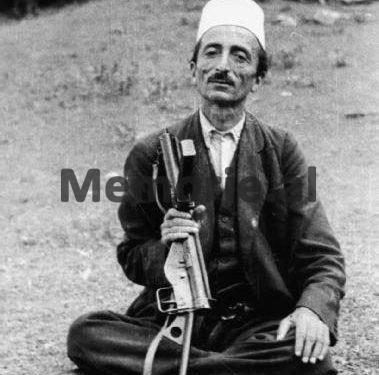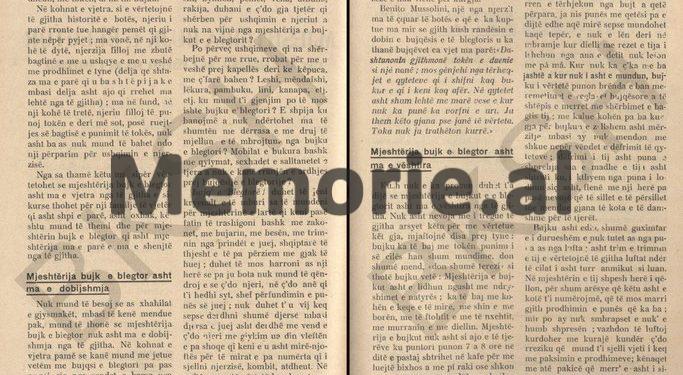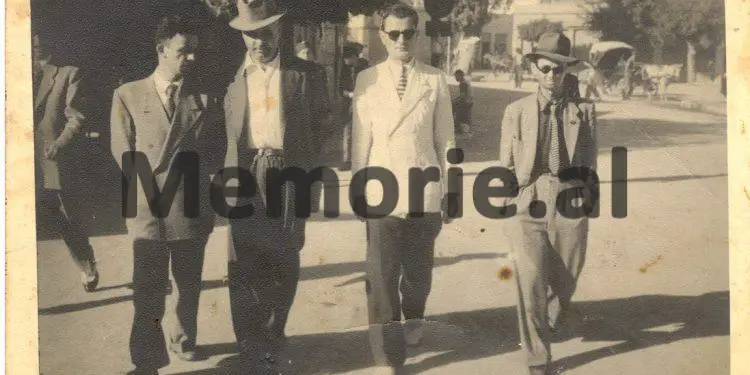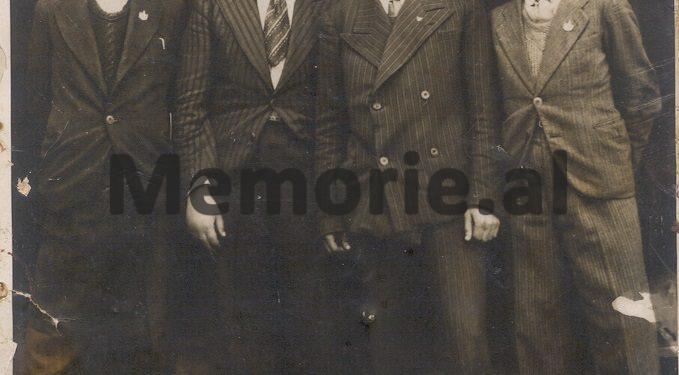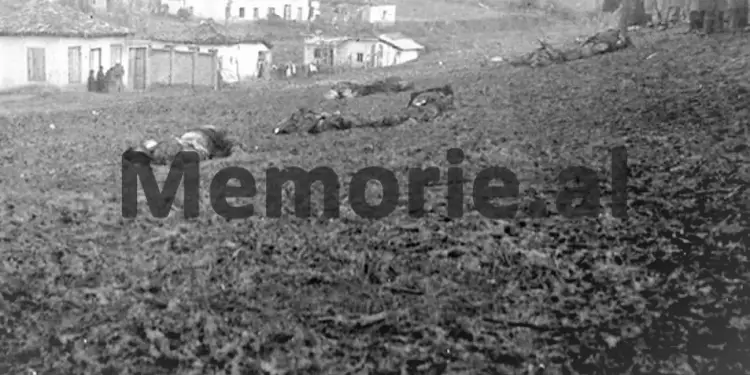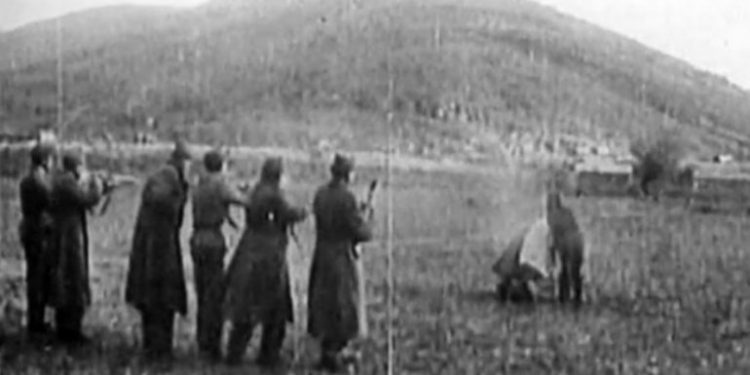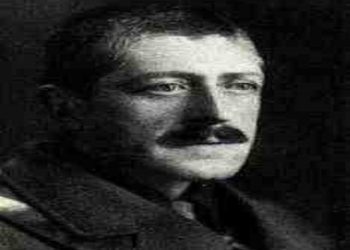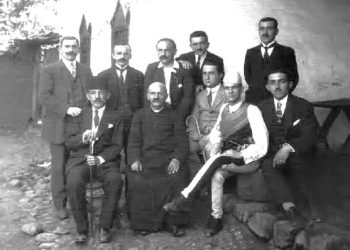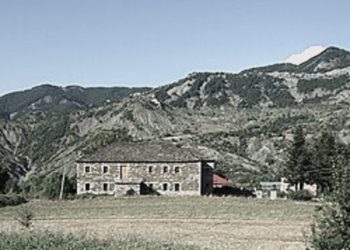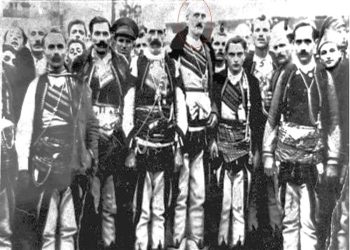By Adi Darsi
Memorie.al / It is no coincidence that for many of the learned and prominent men of our country, who lived and acted in the first half of the 20th century, you find little or no data. Communism not only killed them and left many of them without graves, but “took care” in the years of the continuation of the red terror, to eradicate everything from their heritage and values. This also happened to Isuf Allmani, his Allaman tribe in Kurdari, and many, many other patriots educated by Mati.
Who was Isuf Allamani?
Born in 1907, in the village of Kurdari, in the Allamani tribe (one of the four families that had owned Mati for hundreds of years – Zogolli, Allamani, Çela and Bozhiqi), he would stand out for his love of knowledge. The son of a wealthy family that inherited large tracts of land and a large number of cattle, it is no wonder that he chooses to become a veterinarian. He studied in Italy, for that profession where he received a diploma from the University of Florence. He returns to his homeland as a learned intellectual and stands out among many others who had completed higher studies in the best European universities of the time.
Proof of this are dozens of articles and studies published in the press of the time, especially in the magazines “National Economy”, “Technical Bulletin” and “Agriculture”. He is deeply focused on his profession and the published materials show this. But as we will see in a writing brought below, like a true intellectual, he calls to appreciate the farmer and the rancher, since in them he sees the people who exercise “the most sacred craft of all”.
At the same time, he seeks to make them aware of the great role they have in society. As a true patriot he writes; “Livestock farmers and farmers! If you do not know, you must not forget that you are the most prosperous for humanity, for the Motherland, for the Nation. Without you and your craft, life is impossible neither in war nor in peace. You alone are the ones who protect humanity, race, language, customs”. So it is not surprising that a knowledgeable and skilled professional like him, serves “directly in production”, being one of the main managers of the Xhafzotaj farm, which at that time was the most advanced and modern agricultural economy. in place.
Did King Zog influence his career? This cannot be excluded in his selection for education. Although the Allamans’ relations with the Zogolls, during the 20th century, had often been strained, the King who stood out for a humane treatment of even his most ferocious enemies, certainly would not exclude Isuf Allaman from schooling either. Then his prowess would speak for itself. Married to an Italian woman, Lonela, with whom he had a son (named Allaman), he will continue to serve on the farm even during the Italian occupation, to become its director, during the years of the German occupation.
Shooting among intellectuals
Isuf Allamani had the tragic fate of all prominent intellectuals of the time: He was shot by the communists. In those turbulent times, he was deeply focused on his profession, and did not mix with politics at all, but this would not save him. Of the different accounts of how he was killed, there are three variants of which we cannot say which is the most reliable. What is known for certain is that he was shot at the peak of his maturity, when he was only 37 years old. This happened on November 3, 1944. It was the time of communist terror in Central Albania, especially in the capital.
In his writing about the murders of this time, Uran Butka, brings these facts; “On November 3, 1944, the communist forces shot without trial in Sharre, Tirana, the three prominent Deliallis of Shijak: Kapllan Deliallisi, deputy of Shijak in the Albanian Parliament and his brother, Jakup Deliallisi, former mayor of the municipality of Shënavlash and Luz. Along with them, Shefqet Deliallisi, the son of the well-known patriot Ymer Deliallisi – personal secretary of Ismail Qemali, a young officer, graduated from the Military Academy in Rome, but who welcomed the fascist invasion with indignation and left his post , because he was against the invaders, just as the Deliallis of Shijak have been for generations. Along with these martyrs, Isuf Allamani, from the family of the Allamani of Mati, was also shot.”
There is a version that says that they were arrested in different places and then sent to Peza and from there to the village of Sharre in Tirana, where they were shot. It is not to exclude this version, since the communists knew very well who Isuf Allamani was and what family he came from. Another version brought in an article by Xhevahir Gradica states that; at Isuf Allamani’s house in Xhafzotaj, his friends, Jakup and Kapllan Deliallisi, go for dinner. Allamani’s house is surrounded by partisan forces who then forcefully kidnap the Deliallis’ two men. But Isuf Allmani could not resist the temptation of taking the housemates by force. So he decides to go with the Deliallis.”
But there is also a third version according to which Isufi was asked by the communists to bring his friends the Delialllis to a meeting in Peza. It is a fact that he had friends with them, as is another fact, that the director of the farm during the time of the Italians was Medar Shtylla. He would become one of the top communist leaders, and it is not surprising that since he knew Isuf very well, he asked him for that “honor”. After they go to Peza, they tell him that the Deliallis will be shot. –
“There is no way to do this job – says Isufi – without shooting me too. I don’t trust my friends”. But the communists knew the faith. Together with his friends, they first shoot Isuf himself. Sali Verdha, who is said to have been one of the members of the firing squad, after the fall of communism, told the Allamans that; “Isufi was killed first, at Ura e Beshiri, protecting his friends, Jakup and Kapllan Deliallisi”. The three of them were buried together and their remains were found there in 1992.
The Allamans, prey to communist terror
The shooting of Isuf Allamani, whatever it was, was not a coincidence. His tribe in Mat, and in particular, the elder brother who headed the family, Dyl Allamani, would have the same fate, in the spring of 1945. A friend of Abaz Kupin, his tower would be a refuge for the nationalist forces. but also the British missions during the War years. This had put him in front of the partisan forces of Haxhi Lleshi, who would not forgive him, even though Dyl Allamani had become close friends with Myslym Peza, whom he had known in Dibër e Madhe, in the years when both were hiding there after the clashes that they had with King Zog. So during the years of the War, Haxhi Lleshi with his forces, tried to burn the towers of the Allamans, but they were unable to do something like that.
After the liberation, in the spring of 1945, it will be the 5th partisan (terrorist) Brigade of Shefqet Peç, which will burn the towers, after having killed 20 men (they were: Rushit Allamani, Sulë Allamani, Hysen Allamani, Dudie Kadiu ) and will take with him the arrested 50-year-old Dyl Allamani (he turned himself in to save the others), who was then executed on the day of the Eid holiday, on the Riverside in Tirana. His remains were never found.
The dead of Mati
In those days of communist terror, among the most prominent intellectuals of the country, there will be many educated Matians. Considered to be people of Zog’s regime, they are shot and then their families enter the long years of persecution. In the list of those killed in less than three weeks, together with Isuf Allamani, there are also Mehmet Dada from Mati, a military graduate in Italy, Selman Shtjefni from Mati, a knight in the Royal Guard, Bajram Cuka from Mati, gendarmerie commander in Durrës.
They are considered “enemies”, just like the Deliallisi brothers, like Seluadin Korça, the son of the famous Hafiz Ali Korça, like the Kokalari brothers from Gjirokastra, like the publisher and journalist Nebil Çika or even the well-known theologian from Tirana, Selim Brahja. In December 2009, the President of the Republic decorated all 36 intellectuals killed in the period October 28-November 16, 1944 with the “Honour of the Nation” Order, with the motivation: “Martyrized by communist terror because of their belief in democratic ideas development of Albania after World War II”.
Writing in the magazine “National Economy”
Dr. Isuf Allamani
There are many people – of course, people who do not judge deeply – whom Terenc Toçi rightly calls ignorant and half-hearted, who do not know how to appreciate the great value of farming and animal husbandry skills. For these gentlemen, agriculture and animal husbandry are for the ignorant peasant who does not care about the world (does not care about the world); according to your opinion, who is a man who does tenezyl (accepts) if a fool burns all day in the sun, tills the ground and then closes the manger of the living possibility where there is manure, the hen house and the bee hives, instead of shops with lavender and flowers and instead of coffee with gambling cards and brandy.
The half-witted people would not have dealt with such work even if they were dying for bread, because for them, spending my life in the fields and in the middle of the cattle, far from the entertainments of the city, is a great stupidity, even a “sin you have God”! Such discussions and judgments for the majority of farmers and livestock breeders do not have the slightest importance, because they know very well how valuable and how useful their craft is; but for some others, the contempt which is paid to their craftsmanship, may greatly spoil the zeal of the just and honest farmer, and cause their emigration, from the beautiful and fertile field and, from the useful cattle, without which it is not possible to live, not even in the city full of germs where even the most virtuous person cannot avoid bad and shameful deeds.
To show the farmer and the livestock breeder the place they have, to warn them about the risk of moving to the city, to show the ignorant and half-hearted that their judgment about the agricultural and livestock master is completely wrong and out of place, and finally, to protect the true craft of the Albanian with foundation, I have written these few lines, which I hope will be enough, to prove the title of this article.
The craftsmanship of farming and cattle breeding is my favorite
All the religious books are of the same opinion that the first man was created from clay and how our body comes out after death, returns and is made again; this means that the real man, or better, the closest man to God, is the one who deals with and lives with the land, that is, the farmer. In ancient times, as all the world’s histories prove, the first man lived in the trees he found in the forests; later, in a second time, people began to tame livestock and feed and clothe themselves with their products (the sheep was the first domesticated animal, because the sheep is the one that is beaten, easier than all); finally, in a third time, man begins to work the land and until today, apart from keeping cattle and working the land, there is no progress, nor can it be made, for the food of the people.
From what we said here above, it is proven that the craftsmanship of the farmer and cattle breeder is the oldest of all, and it is said about an old family, that it is the first stove, it is the fireplace, the same can be said about the craftsman, farmer and cattle breeder, which is the first and holiest of all crafts.
The skill of farming and animal husbandry is the most useful for me
I can’t believe that even half-wits, after thinking a little, can say that farming and livestock farming is not the most useful of all. In the old times, we saw that they could live only with agriculture and animal husbandry, without any of the things we made from other crafts; until recently, this also happened in many mountains of our country.
But in order to better fill the mind of those who think differently, we must tell them that even in today’s time, for the life of any human being, in any case, the products provided by agriculture and animal husbandry are necessary. Corn, wheat, barley, rye, bran, grosha, rice, sugar, coffee, vegetables, meat, dairy, trees, vines, vinegar, brandy, tobacco and everything else that serves for human food do not come to us from the skill of the farmer and the cattle breeder?
Besides the food that they serve us for shaving, the clothes for wearing from the hat to the shoes, what are they used for? Wool, silk, leather, cotton, linen, hemp, etc. etc. where can we find them if it wasn’t the farmer and the rancher? In the village where we live, isn’t it mostly built with boards and wood to protect the milking house, from the farmer and the rancher? Do not the beautiful furniture, together with rugs, carpets and other decorations, have the roots of coming from agriculture and animal husbandry?
Farmers and Cattlemen! You must be arrogant and proud as much as you can for the high craftsmanship that you were lucky enough to inherit along with the customs, generosity, faith, and bravery from your parents, pure Albanians without mixing with foreign blood; you must never forget that without you the world cannot stand and that no matter who you are, no matter where you look, you will see the end of your work; I shouldn’t feel bad for you because you sweat a lot because your sweat is poured instead and anyone with judgment knows the incomparable value you have and I am grateful for the countless benefits you bring to the people, the nation, the homeland.
If there really is heaven, the first place will be for you who work righteously and who give up so badly to keep the rest of us alive, and if there is anyone in the world who is happy you are the one who has a clear conscience about the duty you perform with unparalleled honor. Do not covet the cities and their crafts; between cities, anything long is like a rotten apple that has a beautiful red and white skin and that is all black inside and is not worth the money. The earth never betrays you.
Mastery of farming and livestock breeding is the most difficult
Anyone who has not tried it should know that the skills of a farmer and livestock breeder are the most difficult of all. There is no need to show all the reasons here to prove this point, some of them are enough: the farmer has given up on the land, the work of which takes a lot of effort, requires a lot of thought, “requires a lot of care” as the farmer himself says. The skill of the farmer is closely related to the changes of nature; it has to do with bad and good weather, with snow and sleet, with cold and hot, with wind and sun.
The skill of the farmer is not like that of others where the worker works 7 or 8 hours a day and then lies down in a cafe to play gambling or drink brandy or goes to the cinema to have fun; the farmer, be it summer or sun, wakes up and the light dawns, and, at the time of plowing with oxen in front and plow in his arms, at the time of weeding and grafting with a scythe in his hand, at the time of plowing and watering with a hoe in his arms, at the time of mowing with the scythe around the neck, at the time of the harvest with the sickle under the arm, at the time of shooting that the manure is loaded with baskets on a horse or donkey or with a cart and pulled by oxen or oxen in front, I go to work calmly without knowing it that well, because he tries so hard, and he doesn’t let go until the evening, when the sun with its rays throws him from the side of the sea, he doesn’t let go anymore.
When there is nothing to do outside or when it is not possible, the real farmer works inside and does the maintenance of agricultural tools or the house and deals with the services of his livestock. Passing the time without doing anything is boring for the diligent farmer, since he does not think of going to the entertainment places of the cities. His entertainment is his work and his greatest rest is his bed where, when we return from work and are tired as it is, they sleep immediately without the need to behave and convey to them useless and harmful thoughts for others.
The farmer is very brave and patient and does not get tired either from work or from war, he is brave and his bravery is proven by all the wars in which he is like a lion to his enemy. He often shoots at his master, for many reasons that it is pointless to enumerate here, so that he does not receive all the production of the work that he has; well, he does not retreat and does not lose hope; always continues to fight with courage against any danger that the bad year may bring with the decrease of productions; he is satisfied with the little he gets and I am sure that next time he will be better rewarded for the services he gives to the earth.
The mastery of a farmer, as well as that of a livestock breeder, is one of the most difficult; animal husbandry is closely related to agriculture and agriculture to animal husbandry; neither can it live without the other: as you know, animals feed on agricultural products and the land on agricultural products because it is worked with the power of animals and fertilized with their manure. Animal husbandry therefore depends on agriculture, and if this is difficult as a skill, then its sister will be without another.
The herdsman, like the farmer, deals with the changes (phenomena) of nature that do not even slightly depend on the will of man; it has to do with livestock, man’s best friend is speechless to be consulted in everyday cases with him. Even the herdsman, like the farmer, suffers a lot for his animals: for their preservation, he begs to spend a lot of time of his life in the rain, in the snow, in the cold, in the field, in the mountains, sometimes with opinga, sometimes with Bare feet with a piece of corn bread and an onion in a bowl.
But with all this, he is the happiest man in the world, and his fiddle and kanga are worth a thousand times the music, operas and theaters; he is satisfied with his craft because he knows that the livestock he keeps has rewarded all his sufferings, and it is enough for him to see your little offspring wandering in the meadows and in the fields to forget everything bad. Livestock farmers! If you do not know, you must not forget that you are the most prosperous for humanity, for the Motherland, for the Nation. Without you and your craft, life is impossible neither in war nor in peace. You alone are the ones who protect humanity, race, language, customs.
The skill of farming and cattle breeding is my most honest
Is there anyone who can say that farming and livestock farming is not the most honest of all? I do not believe. Farmers and ranchers earn their living, not because you worked hard for the other person to earn more, but because you worked your land and took care of your cattle, from which if you don’t do it right, you don’t get the money. Farmers and ranchers can only lie to themselves if they do not do their duty as beggars.
The reader should remember that with what I wrote above, I want to support the farmer and the cattle breeder, because more or less agriculture and cattle breeding are my skills and because I have a great love for these two. No, I would never do such a thing, if everything that was said here were not true, I’m sorry. Memorie.al




